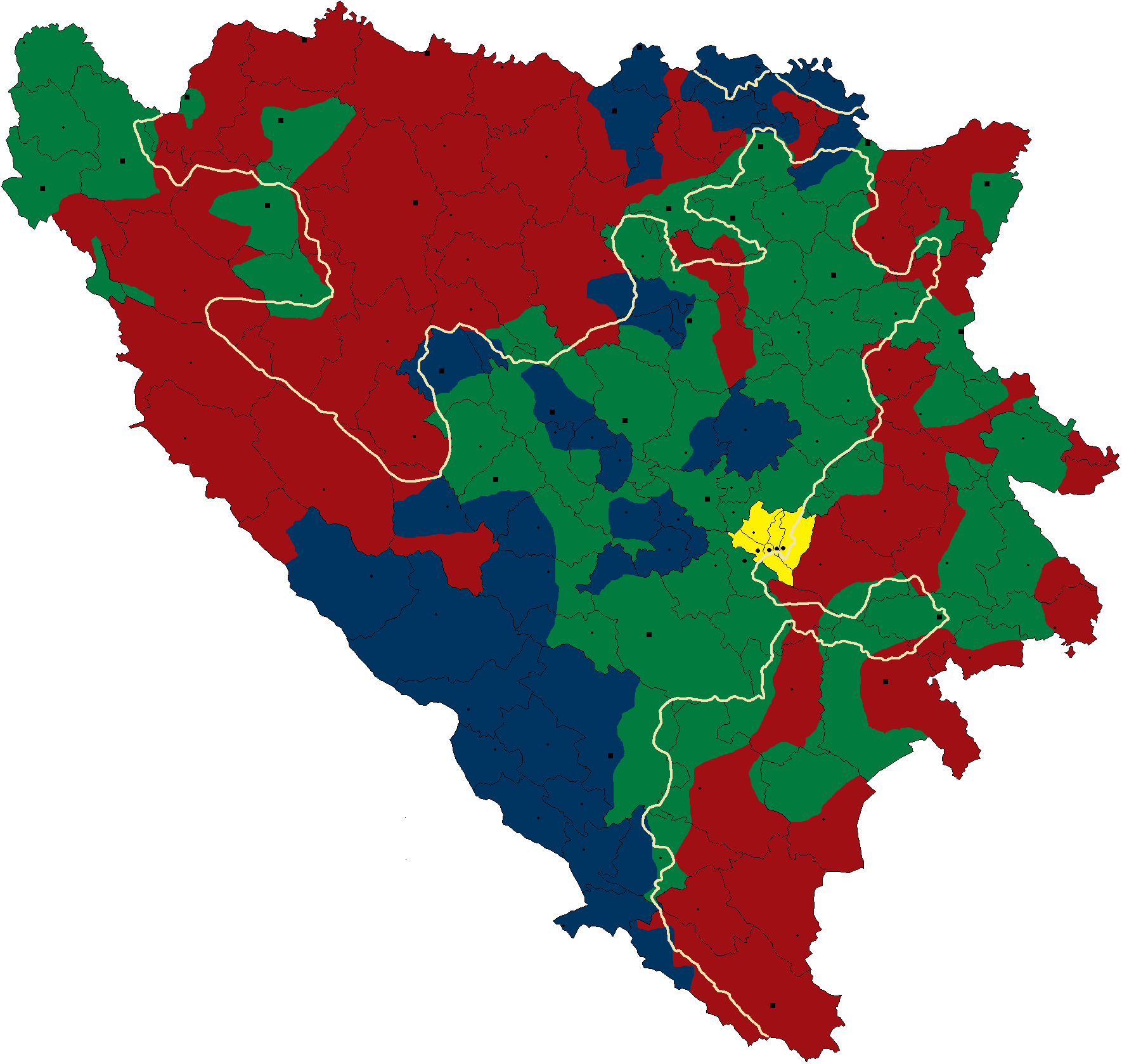|
Alija Izetbegović
Alija Izetbegović (; 8 August 1925 – 19 October 2003) was a Bosnian politician, Islamic philosophy, Islamic philosopher and author, who in 1992 became the first Chairman of the Presidency of Bosnia and Herzegovina, president of the Presidency of the newly independent Republic of Bosnia and Herzegovina. He later served as the first chairman of the Presidency of Bosnia and Herzegovina. Shortly after his term began, the country's Serbs of Bosnia and Herzegovina, Serb community revolted and created the Republika Srpska (1992–1995), Republika Srpska, attempting to prevent the secession of Bosnia and Herzegovina from Socialist Federal Republic of Yugoslavia, Yugoslavia, which would lead to the outbreak of the Bosnian War. Izetbegović led the Bosniaks, Bosniak forces initially alongside the Croats of Bosnia and Herzegovina, Croat forces, until a Croat–Bosniak War, separate war erupted between them. Relations between the two sides were resolved in the Washington Agreement (1994), ... [...More Info...] [...Related Items...] OR: [Wikipedia] [Google] [Baidu] |
Chairman Of The Presidency Of Bosnia And Herzegovina
The chairman of the Presidency of Bosnia and Herzegovina is the presiding member of the Presidency of Bosnia and Herzegovina, which collectively serves as head of state of Bosnia and Herzegovina. Željka Cvijanović is the incumbent officeholder, having served since 16 November 2024. Constitution of Bosnia and Herzegovina According to the Article V of the Constitution of Bosnia and Herzegovina, the Presidency comprises three members, representing the constituent nations of Bosnia and Herzegovina: one Bosniak, one Serb, and one Croat. The Bosniak and Croat members are elected from a joint constituency in the Federation of Bosnia and Herzegovina, whilst the Serb member is elected from voters in Republika Srpska. The three members elected at any one election serve a collective four-year term. Individuals are able to serve no more than two consecutive four-year terms, although there are no overall term limits. Although the unsubdivided body is the collective head of state, o ... [...More Info...] [...Related Items...] OR: [Wikipedia] [Google] [Baidu] |
Intra-Bosnian Muslim War
The Intra-Bosnian Muslim War () was a civil war fought between the Army of the Republic of Bosnia and Herzegovina loyal to central government of Alija Izetbegović in Sarajevo and the Autonomous Province of Western Bosnia loyal to Fikret Abdić in Velika Kladuša from 1993 to 1995 in the region of the western Bosnia. The war ended with the victory of the Army of the Republic of Bosnia and Herzegovina and the abolishment of Western Bosnia. Background The Cazinska Krajina region, located in the far north-western part of Bosanska Krajina, had a slightly higher GDP per capita compared to the average of the Socialist Republic of Bosnia and Herzegovina. Predominantly populated by Bosnian Muslims, the region encompasses the municipalities of Bihać, Cazin, and Velika Kladuša. To the north and west, it borders Croatia, while to the south and east, it is separated from the broader Muslim population by Serb- and Croat-majority areas. Fikret Abdić founded the agricultural company A ... [...More Info...] [...Related Items...] OR: [Wikipedia] [Google] [Baidu] |
Croat–Bosniak War
The Croat–Bosniak War or Croat–Muslim War was a conflict between the Bosniak-dominated Republic of Bosnia and Herzegovina and the Croatian Republic of Herzeg-Bosnia, supported by Croatia, that lasted from 18 October 1992 to 23 February 1994. It is often referred to as a "war within a war" because it was part of the larger Bosnian War. In the beginning, the Army of the Republic of Bosnia and Herzegovina and the Croatian Defence Council (HVO) fought together in an alliance against the Yugoslav People's Army (JNA) and the Army of Republika Srpska (VRS). By the end of 1992, however, tensions between the Army of the Republic of Bosnia and Herzegovina and the Croatian Defence Council increased. The first armed incidents between them occurred in October 1992 in central Bosnia (region), Bosnia. The military alliance continued until early 1993, when it mostly fell apart and the two former allies engaged in open conflict. The Croat–Bosniak War escalated in central Bosnia and soon ... [...More Info...] [...Related Items...] OR: [Wikipedia] [Google] [Baidu] |
Bosnian War
The Bosnian War ( / Рат у Босни и Херцеговини) was an international armed conflict that took place in Republic of Bosnia and Herzegovina, Bosnia and Herzegovina between 1992 and 1995. Following several earlier violent incidents, the war is commonly seen as having started on 6 April 1992 when the newly independent Republic of Bosnia and Herzegovina was internationally recognized. It ended on 21 November 1995 when the Dayton accords, Dayton Accords were initialed. The main belligerents were the forces of the government of the Republic of Bosnia and Herzegovina, and those of the breakaway proto-states of the Croatian Republic of Herzeg-Bosnia, Republic of Herzeg-Bosnia and the Republika Srpska (1992–1995), Republika Srpska which were led and supplied by Croatia and Republic of Serbia (1992–2006), Serbia, respectively. The war was part of the breakup of Yugoslavia. Following the Slovenian and Croatian secessions from the Socialist Federal Republic of Yugosla ... [...More Info...] [...Related Items...] OR: [Wikipedia] [Google] [Baidu] |
Army Of The Republic Of Bosnia And Herzegovina
The Army of the Republic of Bosnia and Herzegovina (; ; ARBiH), often referred to as Bosnian Army, was the military force of the Republic of Bosnia and Herzegovina. It was established by the government of the Republic of Bosnia and Herzegovina in 1992 following the outbreak of the Bosnian War. Following the end of the war, and the signing of the Dayton Peace Agreement in 1995, it was transformed into the Army of the Federation of Bosnia and Herzegovina. The ARBiH was the only military force on the territory of Bosnia and Herzegovina recognised as legal by other governments. Under the State Defense Reform Law the Armed Forces of Bosnia and Herzegovina were unified into a single structure, the Armed Forces of Bosnia and Herzegovina (OSBiH), making entity armies defunct. History Creation and composition The Army of Republic of Bosnia and Herzegovina was formed on 15 April 1992 during the early days of the Bosnian War. Before the ARBiH was officially created, a number of para ... [...More Info...] [...Related Items...] OR: [Wikipedia] [Google] [Baidu] |
Republic Of Bosnia And Herzegovina
The Republic of Bosnia and Herzegovina ( sh-Latn-Cyrl, Republika Bosna i Hercegovina, Република Босна и Херцеговина, separator=" / ") was a state in Southeastern Europe, existing from 1992 to 1995. It is the direct legal predecessor to the modern-day state of Bosnia and Herzegovina. Bosnia and Herzegovina secession, seceded from the Breakup of Yugoslavia, disintegrating Socialist Federal Republic of Yugoslavia on 3 March 1992. The Bosnian War broke out soon after its Declaration of Independence and lasted for 3 years. Leaders from two of the three main ethnicities of Bosnia and Herzegovina, namely the Bosnian Serbs, Serbs and the Bosnian Croats, Croats, separately established their separatist quasi-states of Republika Srpska (1992–95), Republika Srpska and the Croatian Republic of Herzeg-Bosnia, respectively, which were unrecognized by the Bosnian state and international governments. With the majority of Bosnian Serbs and Croats opting for their respec ... [...More Info...] [...Related Items...] OR: [Wikipedia] [Google] [Baidu] |
Master Of Laws
A Master of Laws (M.L. or LL.M.; Latin: ' or ') is a postgraduate academic degree, pursued by those either holding an undergraduate academic law degree, a professional law degree, or an undergraduate degree in another subject. In many jurisdictions, the LL.M. is an advanced professional degree for those already admitted to legal practice. Definition To become a lawyer and practice law in most jurisdictions, a person must first obtain a law degree. In most common law countries, a Bachelor of Laws (LL.B.) is required. In the United States, a bachelor's degree followed by the Juris Doctor (J.D.), a graduate school degree, and passing an additional set of examinations (the Bar exam) is typically required to practice law. The LL.M. program is an advanced postgraduate law program. In Canada, an LL.B is required to enter an LL.M program; in the United States and Australia, a J.D. is required. Specialized LL.M. programs have been introduced in many European countries. An LL.M. d ... [...More Info...] [...Related Items...] OR: [Wikipedia] [Google] [Baidu] |
Bachelor Of Laws
A Bachelor of Laws (; LLB) is an undergraduate law degree offered in most common law countries as the primary law degree and serves as the first professional qualification for legal practitioners. This degree requires the study of core legal subjects and jurisprudence to provide a comprehensive understanding of the legal system and its function. The LLB curriculum is designed to impart a thorough knowledge of legal principles, legal research skills, and a sound understanding of the roles and responsibilities of lawyers within society. This degree is often a prerequisite for taking bar exams or qualifying as a practising lawyer, depending on the jurisdiction. Additionally, the LLB program also serves as a foundation for further legal education, such as a Master of Laws (LLM) or other postgraduate studies in law. Region awarded Bachelor of Laws degrees are awarded by universities in regions including Europe, Australia, China, Hong Kong, Macau, Malaysia, Bangladesh, India, Indonesia ... [...More Info...] [...Related Items...] OR: [Wikipedia] [Google] [Baidu] |
University Of Sarajevo
The University of Sarajevo (Bosnian language, Bosnian, Croatian language, Croatian and Serbian language, Serbian: ''Univerzitet u Sarajevu'' / Sveučilište u Sarajevu / Универзитет у Сарајеву) is a List of universities in Bosnia and Herzegovina, public university located in Sarajevo, Bosnia and Herzegovina. It is the largest and oldest university in the country, tracing its initial origins to 1537 as an Islamic madrasa. With 20 faculties, three academies and three faculties of theology and with 23,127 enrolled students as of 2021, it ranks among the largest universities in the Balkans in terms of enrollment. Since opening its doors in 1949, a total of 122,000 students have received bachelor's degrees, 3,891 have received master's degrees and 2,284 have received doctorate degrees in 45 different fields. It is now widely regarded as the most prestigious university in Bosnia and Herzegovina, and employs more than one thousand faculty members. History Ottoman pe ... [...More Info...] [...Related Items...] OR: [Wikipedia] [Google] [Baidu] |
Bakir Izetbegović
Bakir Izetbegović (; born 28 June 1956) is a Bosnian politician who served as the 6th Bosniak member of the Presidency of Bosnia and Herzegovina from 2010 to 2018. He is the current president of the Party of Democratic Action (SDA). Born in Sarajevo in 1956, Izetbegović is the son of the first and only president of the Republic of Bosnia and Herzegovina, Alija Izetbegović. He graduated from the University of Sarajevo in 1981, working afterwards in architectural firms. After serving as director of the Construction Institute of the Sarajevo Canton, Izetbegović entered politics in 2000. At the 2006 general election, he was elected to the national Parliament. At the 2010 general election, Izetbegović was elected Bosniak member of the Bosnian Presidency. He was re-elected four years later at the 2014 general election. As both Presidency member and president of the SDA, he took part in many constitutional reform talks for Bosnia and Herzegovina. During his presidency, Bosnia ... [...More Info...] [...Related Items...] OR: [Wikipedia] [Google] [Baidu] |





